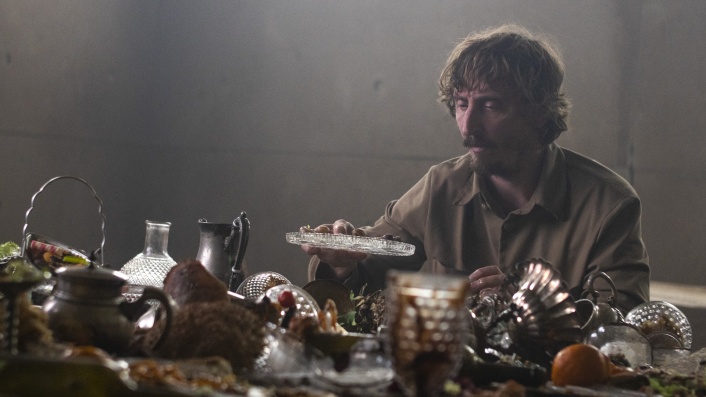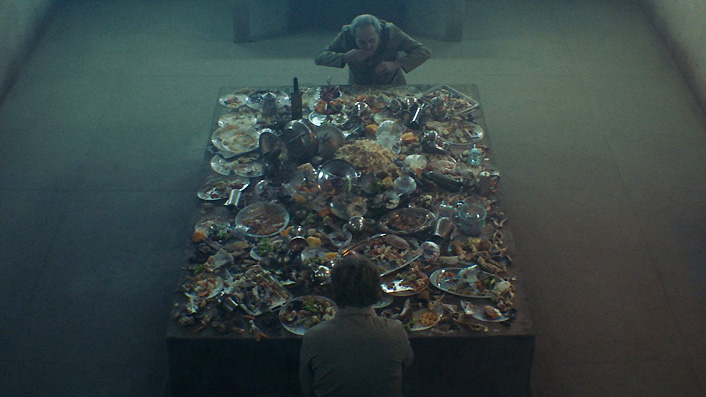What Netflix’s thriller The Platform says about panic buying and food distribution

The Platform arrives freakishly well timed. Based in a prison where the well-off stuff their faces and the less fortunate suffer, its themes include wealth inequality and panic-driven consumption – which, writes critic Luke Buckmaster, is highly relevant to current moment.
Allow me to interrupt your day to bring you – as Dennis Hopper’s villain from Speed might put it – a crack quiz, hotshot! Which of the following scenarios do you believe is more morally acceptable than the other? One: a community has enough food for everybody but people at the top of the class pyramid get first dibs – taking the most and the best, while those at the bottom get the scraps, and some get none at all. Or two: everybody takes what they need, food is distributed more or less evenly, and nobody starves?
This philosophy 101 question is explored visually, spatially and thematically in Netflix’s unsubtle but highly interesting Spanish thriller The Platform, a dystopian parable based in a ‘vertical prison’ housing two inmates per floor. In the middle of each floor exists a large gap through which a platform lined with food moves from the top to the bottom, stopping at each floor, once every 24 hours. People at the top feast on an amazing smorgasboard of fancy dishes and those down the bottom get what’s left – which, on the last floor, is invariably nothing.
You could say the question has obvious political connotations, evoking an argument about free-for-all capitalism versus more socialistic ideology. You could say it is an imploration to find a middle ground: a way to reward people for working hard while also providing essentials for everyone. And you could certainly say the issue of food and resource distribution is particularly relevant in the present moment, during the coronavirus outbreak, when in Australia one cannot even purchase toilet paper from most supermarkets – and often not pasta or rice either.
Is it time to talk about inequality?
You also probably have some understanding of extreme inequality on earth. Oxfam estimates that every day 10,000 people die because they cannot access affordable healthcare, and every year 100 million are forced into extreme poverty – while at the same time there are more billionaires than ever. If you are reading this article, and have access to the internet and Netflix, you are probably somewhere near the middle-top of the social platform, although it probably feels like you’re somewhere near the middle-bottom.
That circumstance, of being somewhere middle-ish in the scheme of things, is literalised by director Galder Gaztelu-Urrutia. Ivan Massagué plays Goreng, who as The Platform opens is sharing floor 47 with an older man named Trimagasi (Zorion Eguileor). Trimagasi is happy to be on this level, believing the pair are well placed within the prison context. He has experienced both better and worse floors, dining on glazed duck from on high and sucking on bare bones from down low.
Trimagasi is a proxy for the average person: he accepts the reality he has been given and is content to work within the system. Goreng on the other hand is a rebel who sees great injustice and reacts by plotting a revolution. When he suggests they speak to the people above to ask them to ration the food, Trimagasi spits back “are you a communist?” He also claims the people above them will never answer their calls even if they tried; after all, they are above.
What The Platform says about panic buying
One element in David Desola and Pedro Rivero’s script puts an immediacy on things, forcing characters to respond within a limited time period during which they are not necessarily thinking clearly. The moving platform only stays on each level for a couple of minutes before descending to the next. This results in a mad scramble for food and people gorging in panic-stricken frenzy. If everybody addressed the situation calmly, taking only what they needed, there would be no shortage going down the line. But, with an absence of leadership, a festering sense of uncertainty and a system that encourages greed, this is not what happens.
Does that sound like a recognisable situation to you? Maybe like something playing out in real-life at the moment? I write this while Australia remains stuck in the grip of a panic-buying frenzy during the spread of the coronavirus. This is the reason why goods such as toilet paper have become precious commodities – as well as, more importantly, hospital equipment such as ventilators.
It’s impossible to know whether this is ‘the new normal’ for the foreseeable future, or whether the situation will be resolved quickly. Either way we now know that, in the throes of a public health crisis, our governments cannot even provide the citizenry something as simple as basic hygiene products. The very wealthy can afford to spend exorbitant amounts for these items (they are the equivalent of the prisoners at the top of The Platform) but the hoi polloi cannot, and are left scrambling and turning on themselves.

Asking questions about healthcare and resource distribution
When the coronavirus crisis passes, do we simply view this experience as a blip on the radar, and return to life as it was before? Or do we use it as an opportunity to explore important questions – about issues such as resource distribution, for instance, and better healthcare and education – entertaining the possibility of a more equitable society? Do we place greater emphasis on electing people with strong and compassionate leadership qualities, rather than the bloke behind the “So where the bloody hell are you?” ads?
Goreng is a gifted leader who rejects the cruelness of the system and spiffy turns of phrase that attempt to disguise its obvious injustices; the prison for instance is referred to by one bureaucrat as a “vertical self-management system.” When he discovers that politely requesting that people do the right thing does not work (like Scott Morrison requesting – rather than enforcing – social distancing measures) his tactics evolve and become more dramatic.
I suspect The Platform‘s screenplay was conceived as a counter to the theory of trickle down economics: a passé and debunked idea that argues what benefits the wealthiest ultimately flows down to benefit the poor also. But this grimly entertaining film – which remains compelling despite repetitive elements and brutal contrivance – poses other questions too. It is hard to know, in the distressing present situation, whether watching it is the best or worst use of your time.















